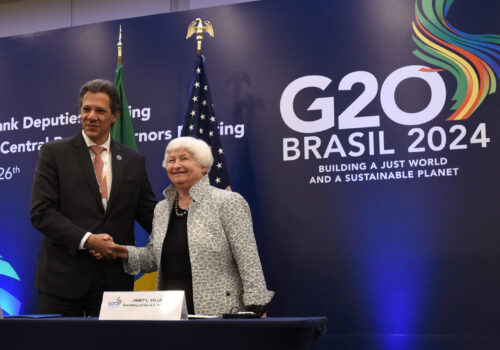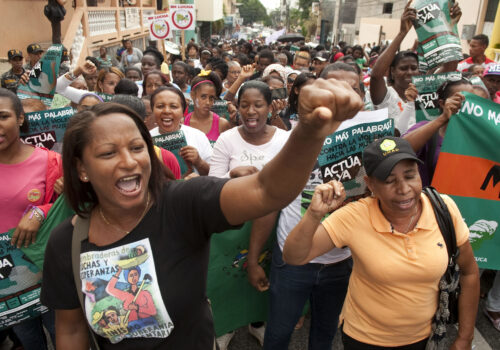When the heads of state and government convened today for the family photo at the Group of Twenty (G20) Leaders’ Summit in Rio de Janeiro, a long-standing problem was readily apparent: Too few leaders are women. This notable and regrettable absence has been the case at previous G20 summits, and yet in an important departure from past years, the G20 under the presidency of Brazil has made real and important strides to advance women’s empowerment.
Last month, the G20 Women’s Empowerment Working Group convened for its first-ever ministerial meeting. “It is not enough to talk about opportunities if we do not face the barriers that prevent women from reaching them,” said Brazilian Minister of Women Cida Gonçalves, underscoring that “female empowerment needs to include all women, especially the most marginalized.” This sentiment speaks to a critical truth: The time for action on gender equality is now. As the group prepares to finalize its declaration, it holds the potential to reshape policies and commitments across G20 nations, marking a significant step toward a more equitable future for women and girls worldwide.
The primary objective of the recent meeting was to advance the draft of the ministerial declaration. This document will outline the G20 countries’ commitments to: (1) Promote the empowerment of all women and girls; (2) achieve gender equality; and (3) eliminate all forms of violence against women. The process involved both virtual and in-person meetings in the last few weeks to refine and finalize the declaration.
Paving the way
The journey toward establishing a dedicated working group for women’s empowerment within the G20 has been gradual. It began in 2015 with the launch of Women20, an engagement group focused on gender-inclusive economic growth. This was followed by the creation of the G20 Alliance for the Empowerment and Progression of Women’s Economic Representation (G20 EMPOWER) in 2019. The culmination of these efforts came in 2023, under India’s G20 presidency, with the formation of the Women’s Empowerment Working Group. Leading up to this year’s G20 meetings in Brazil, South Africa has expressed its commitment to this working group when it takes over the G20 presidency next year. This marks the first time that a specific declaration on women’s empowerment will emerge from a dedicated G20 working group, signifying a major leap forward in addressing gender inequality across various dimensions.
Despite women constituting half of the population, their representation in positions of power remains disproportionately low. Globally, as of 2023, women occupy only 25 percent of foreign affairs ministerial positions and 12 percent of defense ministerial roles. Notably, Costa Rica (50 percent) and Chile (58 percent) have achieved gender parity in their cabinet posts, and in the Caribbean all but four countries (Anguilla, Barbados, Guyana, and Trinidad and Tobago) have at least one woman minister. However, women’s participation in the region’s ministerial cabinets during the most recent term of office averages only 28.7 percent, with Brazil at a mere 6.3 percent. This glaring disparity urgently calls for addressing gender inequality within decision-making bodies, and the G20 can be a useful platform to recognize and advance women’s positions of power.
The agenda ahead
To further advance gender equality and women’s empowerment, the G20 Women’s Empowerment Working Group should focus on two key initiatives.
First, the G20 should encourage member countries to adopt feminist foreign policies (FFPs). Chile’s recent implementation of an FFP, which has increased female ambassadorship from 12 percent to 30 percent in just four years, serves as an inspiring model. While FFPs vary between countries due to their self-declared nature, the example set by Chile, Canada, Spain, and others demonstrate their tangible impact and can guide other G20 nations.
Second, enhancing women’s participation within G20 working groups is crucial. This can be achieved by implementing gender parity strategies in engagement groups and leadership roles, such as rotating between male and female chairs in different G20 tracks or adopting temporary gender quotas. Although quotas have been controversial, they can be effective short-term measures to boost women’s representation. A gender-neutral approach, aiming for a fifty-fifty split or a maximum 40 percent for either gender, could be introduced gradually, starting with select working groups at the 2025 G20 meetings in South Africa. This strategy has the potential to create a “snowball effect”, encouraging broader adoption across all G20 working groups and G20 countries.
However, the G20’s efforts to implement policies promoting women’s empowerment are likely to encounter challenges. Javier Milei, the president of G20 member state Argentina, has voiced strong opposition to gender equality measures. By refusing to sign a widely supported G20 statement on female empowerment, he has created tensions that may lead to a communiqué signed by only nineteen members, excluding Argentina. Despite this, the commitment of the other G20 countries to the declaration on women’s empowerment could still elevate the conversation on gender equality.
The G20 Women’s Empowerment Working Group represents a significant opportunity to drive meaningful changes in gender equality policies across member countries and beyond. With the summit now under way in Brazil, Latin American and Caribbean countries have shown clear examples of what is possible in advancing women’s rights and representation. However, the work doesn’t end with one working group or declaration. G20 countries must commit to ongoing initiatives and policy reforms to truly lead in gender equity. By increasing women’s participation in shaping foreign policy and decision-making processes, the G20 can create more inclusive and effective global governance structures that benefit all.
Maite Gonzalez Latorre is a program assistant at the Atlantic Council’s Adrienne Arsht Latin America Center.
Further reading
Tue, Jul 30, 2024
Dispatch from Rio: Can Brazil set up the G20 leaders’ summit for success?
New Atlanticist By Ananya Kumar, Mrugank Bhusari
Brasília has sought to acknowledge fundamental disagreements on geopolitics between some members, and then to sidestep them entirely at the ministerial level. How long can this approach last?
Wed, Jul 31, 2024
The case for chief gender officers in Caribbean states
New Atlanticist By Valentina Sader
Caribbean countries should consider appointing chief gender officers to help address issues such as gender-based violence.
Thu, Aug 8, 2024
The future of digital transformation and workforce development in Latin America and the Caribbean
Report By Isabel Chiriboga, Maite Gonzalez Latorre, Diego Area
During an off-the-record private roundtable, thought leaders and practitioners from across the Americas evaluated progress made in the implementation of the Regional Agenda for Digital Transformation.
Image: In the photo, President Lula with Minister of Women, Cida Gonçalves. President elected Luiz Inácio Lula da Silva announced new names to compose the ministerial staff of his government in Brasília, DF, Brazil, on December 22, 2022. Photo by Ton Molina/Fotoarena/Sipa USA.



